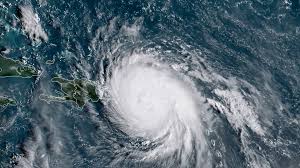Lessons from Hurricane Maria: Radiation oncologists offer advice to better prepare for catastrophic events
 In the wake of Hurricane Maria, a devastating storm that produced the longest blackout in U.S. history, radiation oncologists from the mainland United States and Puerto Rico prepared a set of crisis-planning tips for radiation therapy clinics to minimize gaps in cancer treatment after a catastrophic event. Their emergency preparedness suggestions were published online April 15 in Practical Radiation Oncology, the clinical practice journal of the American Society for Radiation Oncology (ASTRO).
In the wake of Hurricane Maria, a devastating storm that produced the longest blackout in U.S. history, radiation oncologists from the mainland United States and Puerto Rico prepared a set of crisis-planning tips for radiation therapy clinics to minimize gaps in cancer treatment after a catastrophic event. Their emergency preparedness suggestions were published online April 15 in Practical Radiation Oncology, the clinical practice journal of the American Society for Radiation Oncology (ASTRO).
“Worst-case scenarios do occur, and if you wait for something to happen and then start preparing, it’s too late,” said Hiram A. Gay, MD, an associate professor of radiation oncology at the Washington University School of Medicine in St. Louis and lead author of the article. “You need to have systems in place so that patients are better taken care of when disaster hits.”
The paper — a compilation of guidance from experts including radiation oncologists who were in Puerto Rico during the disaster — provides “a list of what we wish we had done beforehand and what we needed most afterwards,” the authors wrote.
On September 20, 2017, Hurricane Maria struck Puerto Rico with sustained wind gusts of 155 mph., a category 4 storm that caused widespread devastation, wreaked havoc on the island’s infrastructure and left the entire island without power and safe drinking water for months. Radiation oncology patients — many who needed treatments on a daily basis — were often unable to get to cancer treatment clinics, and clinics struggled to remain open due to power outages, a lack of safe, running water, insufficient diesel fuel to run generators and technology challenges such as radiation treatment machines that were no longer able to communicate with servers. With cell phone service disrupted, communication between clinics and patients also suffered, making it difficult to reach patients in need of treatment or let them know where they could find it.
Under the leadership of then ASTRO Chair Brian Kavanagh, MD, FASTRO, radiation oncologists with expertise in the most commonly treated cancers collaborated with Dr. Gay to provide suggestions for Puerto Rican clinics to mitigate the potential adverse impact on patient outcomes following Hurricane Maria. While they are not official guidelines, these physicians’ recommendations can offer guidance to radiation therapy clinics should a natural disaster or other crisis cause an extended interruption in treatment.
The tips are broken down into four steps: prepare, communicate, operate and compensate (PCOC), and checklists under each of these four categories outline dozens of steps clinics can take to help minimize treatment delays during a disaster. For example, checklists advise clinics to create emergency operations plans tailored to their unique circumstances; provide patients with access to their treatment plans via flash drives; identify alternative sources of power for radiation therapy machines; and delineate methods to keep in contact with patients, staff and other medical facilities during power and cell phone service outages.
The suggestions also include communication strategies such as working with local radio stations and newspapers to reach patients without internet service, as well as activating personal and family communication networks. In the wake of Hurricane Maria crisis, for instance, ASTRO created public service announcements designed to reach relatives and friends in mainland U.S. cities with high Puerto Rican populations, who could then pass information on to family and friends in Puerto Rico.
The paper’s extensive guidance covers a wide range of strategies, many of which might seem unnecessary on the mainland. But, the authors note, nobody ever thought they’d be necessary in Puerto Rico, either. “This was above and beyond what anybody could imagine,” said Dr. Gay.
“Although a near-total disruption of services is unlikely in the mainland U.S., a similar degree of cascading local or regional dysfunction is indeed possible consequent to hurricanes or other calamities that disrupt the electric power grid, water supply, transportation systems or distribution networks for food, medicine and other critical supplies,” the authors wrote. “The experiences of Hurricane Maria in Puerto Rico (2017), Hurricane Katrina in New Orleans (2005), and Hurricane Andrew in South Florida (1992) provide lessons that can inform preparations to increase resiliency when facing the most probable risks in any locale.”
In some ways, clinics in Puerto Rico were better prepared than clinics in the mainland United States – such as having diesel generators on hand to provide temporary power, said Dr. Gay. The Puerto Rico clinics lacked sufficient fuel to power lights and machinery for long periods of time, however, and had no easy way of replenishing those supplies. Nor could they easily transfer patients to another clinic, as might be possible on the mainland.
Dr. Kavanagh said the checklists could potentially be useful not just for physicians in the United States, but also for those in other nations, especially as radiation therapy clinics become more prevalent across the globe in countries where the electrical grid is vulnerable to major weather events.
“Disaster preparedness is always a challenge,” said Dr. Kavanagh. “We don’t see extreme events very often, but we need to be prepared for worst-case scenarios. One thing that was heartening from this particular experience, though, was the enthusiastic response from all of the mainland experts we contacted. They all wanted to help and put their heads together quickly to provide some guidance that, we hope, was helpful to our friends in Puerto Rico.”